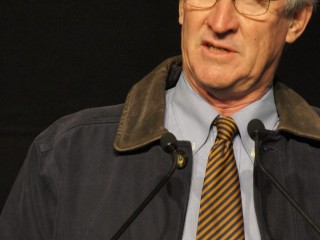 There has been ‘enthusiastic excitement’ rippling through the Indonesian cattle importer and lotfeeder community following news that Australia has rescinded its ban on cattle exports, with a partial re-opening of trade to be directed through approved abattoirs.
There has been ‘enthusiastic excitement’ rippling through the Indonesian cattle importer and lotfeeder community following news that Australia has rescinded its ban on cattle exports, with a partial re-opening of trade to be directed through approved abattoirs.
Meat & Livestock Australia chairman Don Heatley, who arrived in Jakarta overnight in preparation for meetings scheduled tomorrow between Foreign Minister Kevin Rudd and Indonesian officials, said local industry stakeholders had been buoyed by the overnight news.
Mr Heatley will hold further discussions with Indonesian lotfeeders and importers today and tomorrow in support of the government-to-government dialogue.
“The announcement overnight has in no way negated the need for tomorrow’s discussions between Mr Rudd and his Indonesian equivalents, in our view,” he said.
While there had been a lifting of the suspension from Australia’s end, there was still a lot of work to be done before trade can be resumed.
In the first instance, Indonesia has not yet issued import permits for the July 1-September 30 period, and is under no obligation to do so. In the past, however, there have been some instances where Government import permits have been issued mid-term.
“What the Indonesian Ag Minister’s reaction will be in this area remains unclear,” Mr Heatley said.
“There has been absolutely no indication yet about any release of permits, and that decision remains for him solely to make – it might be reached today, or it might take much longer,” he said.
While there had been talk that there might be no permits issued before September 30, Mr Heatley said he certainly hoped that that would not be the case.
“We simply don’t have any indication when permits might start to appear. But it would make little sense to unnecessarily lengthen the period of trade closure, because that scenario (one month suspension by Australia, plus July-September period without import permits) would place both the Australian end and Indonesian end under serious pressure.”
Another factor was the 90 to 100 days required to turn a 340kg animal into a killable proposition in the feedlot, which could further extend the beef shortage in Indonesia.
“Australian cattle arriving on August 1, for example, would not go straight into the marketplace. The lag period would mean they would not reach processing weights until at least the end of October,” Mr Heatley said.
Having said that, the lifting of the suspension by Minister Ludwig in Australia did give the industry (both in Indonesia and Australia) tremendous hope that normal trade might be getting closer to being restored.
Apart from the import permit issue itself, Mr Heatley said there would be a considerable process that would have to be activated, involving discussions about how the protocols would work, and the new procedures that would now take place surrounding live export to Indonesia. That would have to be clearly understood and supported by all parties involved.
The impression from within the trade in Indonesia is that while livestock inventories in many feedlots are now running-down, there is likely to be sufficient livestock available to supply the increased demand over the upcoming Ramadan religious festival period. But it would be after that time that feedlot stocks would reach critically low levels.
Prior to the market suspension in early June, there was an estimated 150,000 to 200,000 Australian cattle on feed in Indonesian lots or holding paddocks.
One solution being talked about as stocks run-down is the prospect for some short-term allowance given by Indonesian authorities for the import of heavier cattle, which would condense the timeframe between import and slaughter. That talk has come primarily from the Australian side of the equation, and may be being coloured by the numbers of cattle available now that are likely to be out of spec for Indonesia, above the current 350kg weight limit, due to the market closure.
“Looking at that purely from a pragmatic, common-sense approach, a case could be built that that might offer part of the solution,” Mr Heatley said, when questioned on the subject.
“But at the same time, the 350kg upper limit protocol was only introduced last year, and it may be too soon to anticipate changes to that – short-term or otherwise. And Indonesia does have its desire to achieve self-sufficiency in mind.”
While the trade suspension was very poorly managed by the Federal Government, Mr Heatley said he remained confident that no permanent damage had been done in the relationship between the two countries.
